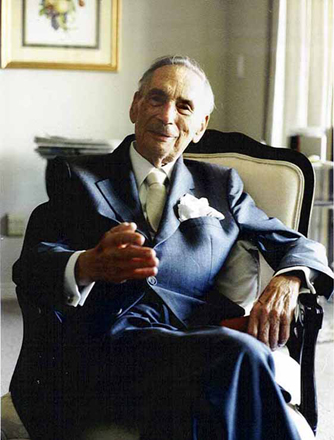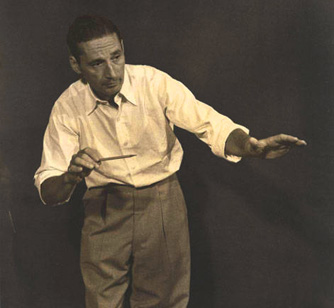|
Born in Brussels in 1900, the American conductor
and pedagogue Leon Barzin was taken to America at the age of two.
He studied the violin with his father, principal viola of the
Metropolitan Opera orchestra, and later with Edouard Deru, Pierre
Henrotte and Eugène Ysaye. He joined the New York Philharmonic in
1919 as a violinist and was appointed first viola in 1925, a
position he retained until 1929, collaborating in those years with
Willem Mengelberg, Wilhelm Furtwängler and Arturo Toscanini. It was
at Toscanini's encouragement that he began his conducting career.
In 1930 he was named principal conductor and musical director of
the
National Orchestral Association, America's leading proving
ground for young professionals and a springboard for generations of
young American instrumentalists. In this capacity he had a notable
success for three decades. In public concerts and in weekly
rehearsals, reaching a wide audience through the New York municipal
radio station, he groomed his players in performances of the
standard repertory. Leon Barzin influence on the quality of
symphonic performance in the United States was enormous and long
lasting, as thousands of young professional players emerged from
the NOA to fill the ranks of the great American symphonic, ballet
and opera orchestras. In 1958 he resigned from the association and
moved to Paris, where he founded the Orchestre Philharmonique de
Paris and taught conducting at the Schola Cantorum. He returned to
New York as Music Director of the National Orchestral Association
in 1970. In 1973 he took the NOA to Italy, where it was orchestra
in residence at the Spoleto Festival Di Due Mondi, participating in
Luchino Visconti's legendary production of Giacomo Puccini's Manon
Lescaut. He resigned in 1976.
|
links
Toscanini/Barzin Technique
National Orchestral Association
Pavillion
d'Artois, Vaux-sur-Seine
|
The great cellist Emanuel Feuermann considered
Barzin to be one of the finest conductors of the twentieth century
and indeed he was a most appreciated collaborator of the foremost
soloists of the day. His years with the NOA were notable for the
dazzling array of artists who appeared under his direction:
Artur
Schnabel, Claudio
Arrau, Bronislaw
Huberman, Nathan
Milstein, Ernst Von
Dohnanyi, Emmanuel
Feuermann,William
Primrose,
Lilian Kallir, Joseph
Szigeti, Felix Salmond,
Myra Hess,
Rudolf
Serkin, Yehudi
Menuhin, Ossip
Gabrilowitsch, Lili
Kraus, Mischa Elman,
Elisabeth
Schumann, Joseph Fuchs,
Lillian Fuchs, Philippe
Entremont, Leonard Rose,
Zino
Francescatti, Oscar Shumsky,
Michael
Rabin, David
Nadien and Rosalyn
Tureck.Leon Barzin was one of the the founders of the
New York
City Ballet and of its predecessor, Ballet Society, with
Lincoln Kirstein and George Balanchine. He remained as Music
Director for ten years. A guest conductor with such orchestras as
the New York Philharmonic and the
Minneapolis Symphony
Orchestra, he was Director of the
Tanglewood Music Center and in charge of education
at the New England Conservatory
of Music.
Barzin was a much sort after teacher of
conducting in New York and later in France - at his home in the rue
Monceau, Paris and at the Pavillion
d'Artois, Vaux-sur-Seine - and in Switzerland. His distinctive
technique was taught as a standard at the Royal Academy of Music in
London. A wonder of modern medical science, he was active as an
educator right until his death in 1999. He received the Columbia
University Ditson Award, the Gold Medal of Lebanon, the Theodore
Thomas Award of the Conductor's Guild and was a recipient of the
Légion d'honneur.
|

